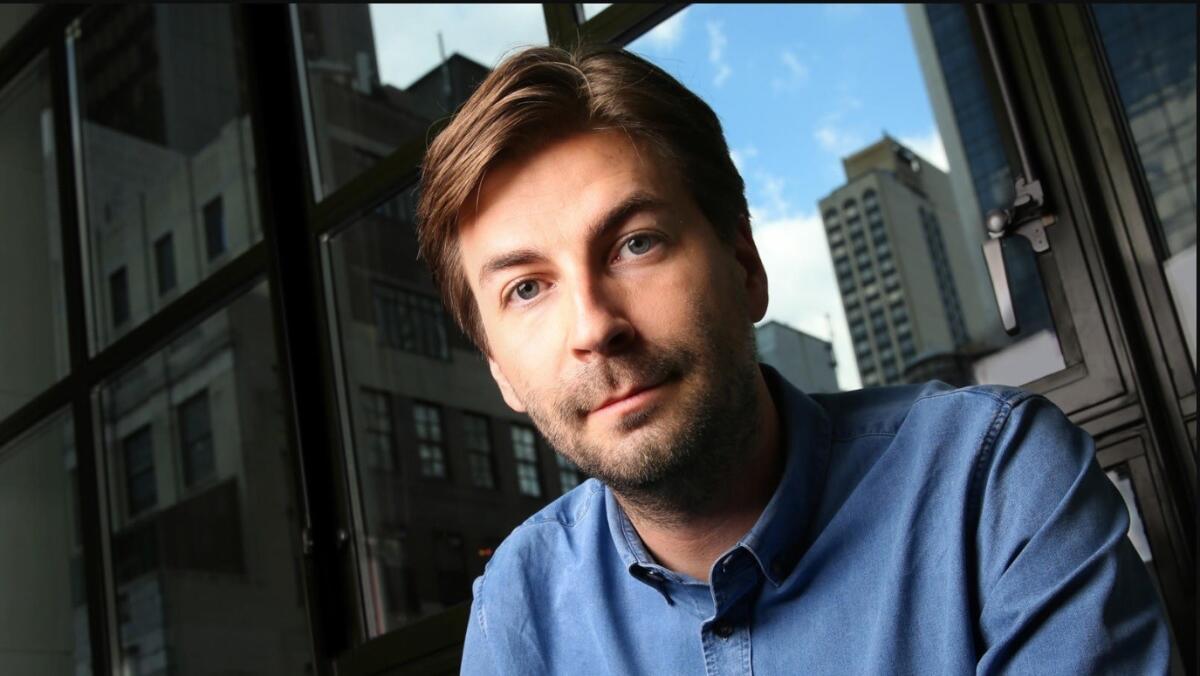The future of ‘Spider-Man’ rests with indie director Jon Watts

It’s been a wild ride for director Jon Watts. Tasked with bringing everyone’s favorite web-slinger to the big screen in “Spider-Man: Homecoming,” Watts has entered the swirling $11.7-billion-grossing maelstrom of the Marvel Cinematic Universe.
And as every super hero knows, with great power ...
“I tried to not think about it while I was making ‘Homecoming’ so I wouldn’t freak myself out,” said Watts, laughing into the phone from New York City in the middle of the most intensive media tour of his young career. “Once this is over, maybe then. It will be nice to have a moment to take stock and appreciate everything and how absurd it is.”
“Absurd” is one word for the surreal whirlwind leap Watts has taken from the independent film world to the studio blockbuster machine. Later this week, just a few days after his 36th birthday, the writer and director will open “Spider-Man: Homecoming” in which the most popular comic book hero of all time officially becomes part of the highest-grossing film franchise in history.
It is Watts’ third feature film.

Watch the trailer for “Spider-Man: Homecoming.”
And with a budget of $175 million, it cost 35 times more than the indie that landed him on Kevin Feige’s radar two years ago.
That was “Cop Car,” a modest Sundance thriller about auto-stealing kids on the lam from an evil lawman, played by Kevin Bacon, that got him in the door at Marvel. Watts had no idea then that those first meetings would land him the biggest opportunity of his career.
“I was excited just to go to Marvel,” said Watts. “I kept my drive-on pass, it was such an exciting thing. Do you remember that ‘Simpsons’ episode where Bart goes to the Mad Magazine headquarters in New York? That’s what I felt like it was going to be like: You walk in, there’s Iron Man making coffee…”
The Colorado native had a background in music videos, commercials and comedy with episodes of the Onion News Network and “Clown,” a little-seen Eli Roth horror movie, under his belt. But he’d also been developing a coming-of-age script based on his own childhood, which he now says placed him in the right mindset to reimagine Peter Parker as a 16-year-old junior superhero, wrestling with his still-developing powers after getting a taste of the big time in “Captain America: Civil War.”
The first thing Watts did to find a new way into the iconic character? Re-read the Spider-Man comics, starting with his introduction in the August 1962 issue of Marvel Comics’ “Amazing Fantasy.”
“That was the best thing I could have done, because it revealed to me what was so exceptional about Spider-Man in the first place,” he said. “What people forget is that Stan Lee and Steve Ditko created him and introduced him into a huge world of superheroes that they had already been building. The idea was, let’s get a regular kid’s take on all of this — let’s have a new perspective.”
Watts and his onscreen Spidey, British actor Tom Holland, then 19, landed their life-changing gigs around the same time and bonded quickly. Watts traveled to Atlanta to watch Holland film his scene-stealing cameo in “Civil War,” a pivotal screen introduction that won over fans and critics and set the stage for “Homecoming,” the first of three contracted films Holland has reportedly signed on for.
“What was great was that we were both total greenhorns. Neither one of us has been in this situation before,” said Watts. “He’s never been the lead of a movie, let alone a huge summer franchise tentpole. I’ve never directed something of this scale, either.”
With a youthful new star taking on the Peter Parker role and one of the franchise’s youngest directors at the helm, “Homecoming” brims with a buoyant energy absent from the previous MCU installments. The film begins with a replay of Peter’s “Captain America: Civil War” airport battle as seen through his millennial eyes — i.e., captured on his smartphone, a detail partly inspired by Holland’s own antics.
“When Tom got the job I was looking at his Instagram and he was already filming everything he does,” Watts explained. “He’s trying to get the job by filming himself doing backflips in his backyard, and that idea definitely originated somewhere around there: He’s filming everything, so Peter should be doing the same.”
When Tony Stark (Robert Downey Jr.) and his driver Happy Hogan (Jon Favreau) drop Peter back home with his new Spider-Man suit and a pat on the head, the eager web-slinger yearns to graduate from friendly neighborhood Spider-Man to Avenger big leagues.
I watched all the Marvel movies from the beginning sequentially with the idea in mind of, ‘Where is Spider-Man in this world?’
— Jon Watts
Meanwhile, he’s dealing with the agony of teen life as a sophomore science nerd with a crush on a senior girl (Laura Harrier), trying to fend off the school bully (Tony Revolori), compete on the school’s academic decathlon squad and keep his best friend (Jacob Batalon) from spilling his secret identity to the entire world.
Peter’s frustrations dovetail with those of Michael Keaton’s Vulture, a self-made supervillain who sprang from a revelation Watts had while binge-watching. (Watts is also one of six credited screenwriters on the film.)
“I watched all the Marvel movies from the beginning sequentially with the idea in mind of, ‘Where is Spider-Man in this world?’” said Watts. “What does a regular human being who lives in New York City know or think about this event? What does the world think of Tony Stark?”
Filming began almost exactly a year ago at Pinewood Studios in Atlanta before production moved to New York City, where it wrapped a little more than three months later.
A modest schedule for a blockbuster, it was a marathon compared to Watts’ previous films.
“Eighty shooting days is almost more shooting days than I’ve ever had in my life leading up to this point,” he quipped of the challenging studio blockbuster pace. “You read stories about people burning out, or people not being able to make it through.”
These days you also read about young directors pushing up against the constraints of multibillion-dollar franchise filmmaking, most recently “Lego Movie” and “21 Jump Street” helmers Phil Lord and Chris Miller, who were fired from Disney’s Han Solo “Star Wars” movie after reported creative differences with their Lucasfilm bosses.
“I can only speak for my own experience, which has been really great,” said Watts with a knowing laugh. “I learned pretty early on in a creative endeavor like this, where a lot of people are working together for something that doesn’t really come together until all the pieces are in place, to just try to be as clear and as articulate and as transparent about what I am trying to do as early as possible. Because you’re not going to be able to fool anyone once it’s up on a big screen for everyone to see.”
With positive buzz and the expectation of a $100-million box-office opening, “Homecoming” and Watts appear to have navigated the transition nicely. But managing expectations has become a necessary concern for Hollywood’s current generation of indie-to-franchise directors — just ask Lord and Miller, “Fantastic Four’s” Josh Trank or “Star Wars: Episode IX’s” Colin Trevorrow, who took a hit this month with his critically derided indie “The Book of Henry.”
“On an independent film where you’re working with just a handful of people you don’t have to explain anything,” Watts said, “because no one cares. You can do whatever you want. There’s no one there to tell you not to do it.
“But if you’re in a larger situation, the best thing you can do is just have a vision and don’t hide it,” added Watts. “Make sure everyone understands it as completely as possible — and understands the controversial elements of it so that you’re not running into trouble later on down the line.”
ALSO:
A breakdown of all the new upgrades to Peter Parker’s ‘Spider-Man: Homecoming’ suit
Inside the deal that brought Sony’s ‘Spider-Man’ back to Marvel’s cinematic universe
Commentary: Why I cried through the fight scenes in ‘Wonder Woman’
More to Read
Only good movies
Get the Indie Focus newsletter, Mark Olsen's weekly guide to the world of cinema.
You may occasionally receive promotional content from the Los Angeles Times.











